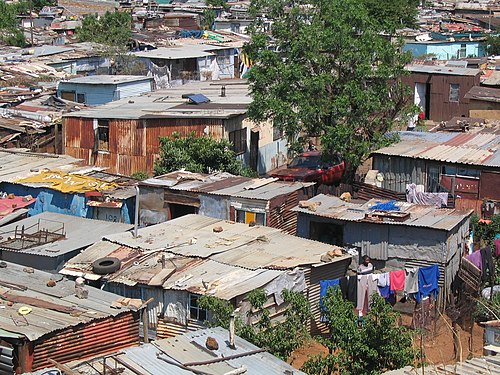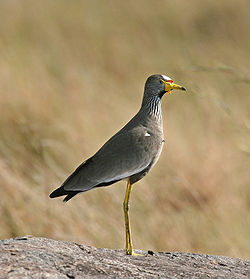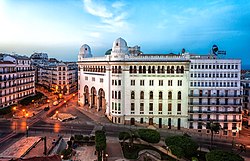Portal:Africa



Africa is the world's second-largest and second-most populous continent after Asia. At about 30.3 million km2 (11.7 million square miles) including adjacent islands, it covers 20% of Earth's land area and 6% of its total surface area. With nearly 1.4 billion people as of 2021, it accounts for about 18% of the world's human population. Africa's population is the youngest among all the continents; the median age in 2012 was 19.7, when the worldwide median age was 30.4. Based on 2024 projections, Africa's population will exceed 3.8 billion people by 2100. Africa is the least wealthy inhabited continent per capita and second-least wealthy by total wealth, ahead of Oceania. Scholars have attributed this to different factors including geography, climate, corruption, colonialism, the Cold War, and neocolonialism. Despite this low concentration of wealth, recent economic expansion and a large and young population make Africa an important economic market in the broader global context, and Africa has a large quantity of natural resources.
Africa is highly biodiverse; it is the continent with the largest number of megafauna species, as it was least affected by the extinction of the Pleistocene megafauna. However, Africa is also heavily affected by a wide range of environmental issues, including desertification, deforestation, water scarcity, and pollution. These entrenched environmental concerns are expected to worsen as climate change impacts Africa. The UN Intergovernmental Panel on Climate Change has identified Africa as the continent most vulnerable to climate change.
The history of Africa is long, complex, and varied, and has often been under-appreciated by the global historical community. In African societies the oral word is revered, and they have generally recorded their history via oral tradition, which has led anthropologists to term them "oral civilisations", contrasted with "literate civilisations" which pride the written word. African culture is rich and diverse both within and between the continent's regions, encompassing art, cuisine, music and dance, religion, and dress.
Africa, particularly Eastern Africa, is widely accepted to be the place of origin of humans and the Hominidae clade, also known as the great apes. The earliest hominids and their ancestors have been dated to around 7 million years ago, and Homo sapiens (modern human) are believed to have originated in Africa 350,000 to 260,000 years ago. In the 4th and 3rd millennia BCE Ancient Egypt, Kerma, Punt, and the Tichitt Tradition emerged in North, East and West Africa, while from 3000 BCE to 500 CE the Bantu expansion swept from modern-day Cameroon through Central, East, and Southern Africa, displacing or absorbing groups such as the Khoisan and Pygmies. Some African empires include Wagadu, Mali, Songhai, Sokoto, Ife, Benin, Asante, the Fatimids, Almoravids, Almohads, Ayyubids, Mamluks, Kongo, Mwene Muji, Luba, Lunda, Kitara, Aksum, Ethiopia, Adal, Ajuran, Kilwa, Sakalava, Imerina, Maravi, Mutapa, Rozvi, Mthwakazi, and Zulu. Despite the predominance of states, many societies were heterarchical and stateless. Slave trades created various diasporas, especially in the Americas. From the late 19th century to early 20th century, driven by the Second Industrial Revolution, most of Africa was rapidly conquered and colonised by European nations, save for Ethiopia and Liberia. European rule had significant impacts on Africa's societies, and colonies were maintained for the purpose of economic exploitation and extraction of natural resources. Most present states emerged from a process of decolonisation following World War II, and established the Organisation of African Unity in 1963, the predecessor to the African Union. The nascent countries decided to keep their colonial borders, with traditional power structures used in governance to varying degrees. (Full article...)
Selected article –
The Kingdom of Kongo (Kongo: Kongo Dya Ntotila or Wene wa Kongo; Portuguese: Reino do Congo) was a kingdom in Central Africa. It was located in present-day northern Angola, the western portion of the Democratic Republic of the Congo, southern Gabon and the Republic of the Congo. At its greatest extent it reached from the Atlantic Ocean in the west to the Kwango River in the east, and from the Congo River in the north to the Kwanza River in the south. The kingdom consisted of several core provinces ruled by the Manikongo, the Portuguese version of the Kongo title Mwene Kongo, meaning "lord or ruler of the Kongo kingdom", and its sphere of influence extended to neighbouring kingdoms, such as Ngoyo, Kakongo, Loango, Ndongo, and Matamba, the latter two located in what became Angola.
From c. 1390 to 1862, it was an independent state. From 1862 to 1914, it functioned intermittently as a vassal state of the Kingdom of Portugal. In 1914, following the Portuguese suppression of a Kongo revolt, Portugal abolished the titular monarchy. The title of King of Kongo was restored from 1915 until 1975, as an honorific without real power. The remaining territories of the kingdom were assimilated into the colony of Portuguese Angola and the Independent State of the Congo respectively. The modern-day Bundu dia Kongo sect favours reviving the kingdom through secession from Angola, the Republic of the Congo, and the Democratic Republic of the Congo. (Full article...)
Featured pictures –
Did you know (auto-generated) -

- ... that activist Gerlin Bean co-founded the Organisation of Women of African and Asian Descent in 1978, an event described as "a watershed in the history of Black women's rights activism"?
- ... that South African politician Speedy Mashilo was kidnapped for seven hours?
- ... that Gil Scott-Heron's 1975 song "Johannesburg" was banned in South Africa during apartheid?
- ... that Tennessee lawyer Bolton Smith was known for his work integrating African Americans into the Boy Scouts?
- ... that in the aftermath of the American Civil War, the only Black-led organization providing teachers to formerly enslaved people was the African Civilization Society?
- ... that Muhsin Hendricks of South Africa has been described as "the world's first openly gay imam"?
Categories
Selected biography –
Francis Piol Bol Bok (born February 1979), a Dinka tribesman and citizen of South Sudan, was a slave for ten years and later became an abolitionist and author living in the United States. (Full article...)
Selected country –
 |
 |
||

| |||
South Africa, officially the Republic of South Africa, is a country located at the southern tip of the African continent. It borders Namibia, Botswana, Zimbabwe, Mozambique, Swaziland, and Lesotho. South Africa is often called the "Rainbow Nation", a term coined by Archbishop Desmond Tutu and later adopted by then President Nelson Mandela.
South Africa is an ethnically diverse nation with the largest white, Indian, and racially-mixed communities in Africa. Black South Africans, who speak nine officially-recognized languages and many more dialects, account for slightly less than 80% of the population. Racial strife between the white minority and the black majority has played a large part in the country's history and politics, culminating in apartheid, which was instituted in 1948 by the National Party (although segregation existed prior to then). The laws that defined apartheid began to be repealed or abolished by the National Party in 1990 after a long and sometimes violent struggle. (Read more...)
Selected city –
Algiers is the capital city of Algeria as well as the capital of the Algiers Province; it extends over many communes without having its own separate governing body. With 2,988,145 residents in 2008 and over 4,510,000 in 2020 in an area of 1,190 square kilometres (460 sq mi), Algiers is the largest city in Algeria, the third largest city on the Mediterranean, sixth in the Arab World, and 11th in Africa. Located in the north-central portion of the country, it extends along the Bay of Algiers surrounded by the Mitidja Plain and major mountain ranges. Its favorable location made it the center of Ottoman and French cultural, political, and architectural influences for the region, shaping it to be the diverse metropolis it is today.
Algiers was formally founded in 972 AD by Buluggin ibn Ziri, though its history goes back to around 1200-250 BC when it was a small settlement of Phoenicians that practiced trade. It was caught under control of many nations and empires such as Numidia, the Roman Empire and the Islamic caliphates, as it went on to become the capital of the Regency of Algiers from 1516 to 1830 AD, then under the control of France due to an invasion that ranked Algiers as capital of French Algeria from 1830 to 1942 AD which temporarily merged with Free France from 1942 to 1944 AD, then back again to French Algeria from 1944 to 1962 AD, and finally capital of Algeria from 1962 to present day after the Algerian Revolution. (Full article...)
In the news
- 21 April 2025 – Spillover of the Sudanese civil war
- 2025 Nasir clashes
- The South Sudan People's Defence Forces capture the town of Nasir in Upper Nile State from the Nuer White Army. (Reuters)
- 21 April 2025 – Boko Haram insurgency
- The Islamic State claims responsibility for a series of deadly attacks targeting Christians and Nigerian security forces in Nigeria earlier this month that killed at least nine people and injured several others. (Reuters)
- 21 April 2025 – 2025 Boston Marathon
- In long-distance running, Kenyan road runner John Korir wins the men's competition at the Boston Marathon with a time of 2:04:45 which, along with his brother Wesley Korir's win in 2012, makes them the first and only set of brothers to win the event. Fellow Kenyan athlete Sharon Lokedi wins the women's competition with a time of 2:17:22 and sets the new course record, surpassing Buzunesh Deba's record in 2014. (The New York Times) (WBZ-TV)
- 19 April 2025 – Herder–farmer conflicts in Nigeria
- The death toll from clashes between cattle herders and farmers earlier this week in Benue State, Nigeria, rises to 56. (Barron's)
- 19 April 2025 –
- A tavern owner is killed and four others are injured in a mass shooting during a live music performance at a tavern in Marble Hall, Limpopo, South Africa. No arrests were made. (SABC)
Updated: 5:05, 22 April 2025
General images -
Africa topics
More did you know –

- ...that the 1459 Fra Mauro map (pictured) reports that "a junk from India" rounded the Cape of Good Hope in 1420, around 70 years before the navigations of Vasco da Gama?
- ...that the 1998 Sudan famine was caused by human rights abuses in the midst of the Second Sudanese Civil War?
- ...that a smokie is a West African delicacy made by blowtorching the carcass of a sheep or goat without removing its fleece?
- ...that Anne-Marie Nzié, a Cameroonian bikutsi singer, dedicated the song Liberté to President Paul Biya and his party, the Cameroon People's Democratic Movement?
Related portals
Major Religions in Africa
North Africa
West Africa
Central Africa
East Africa
Southern Africa
Associated Wikimedia
The following Wikimedia Foundation sister projects provide more on this subject:
-
Commons
Free media repository -
Wikibooks
Free textbooks and manuals -
Wikidata
Free knowledge base -
Wikinews
Free-content news -
Wikiquote
Collection of quotations -
Wikisource
Free-content library -
Wikispecies
Directory of species -
Wikiversity
Free learning tools -
Wikivoyage
Free travel guide -
Wiktionary
Dictionary and thesaurus



























































































